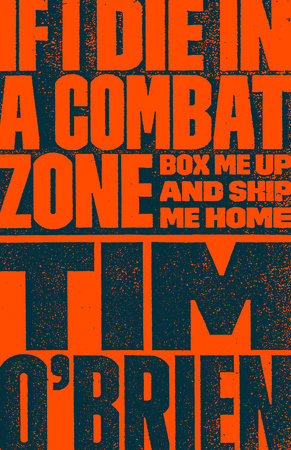If I Die in a Combat Zone Reader’s Guide
By Tim O’Brien


1. O’Brien writes of the Vietnam War, "Things happened, things came to an end. There was no sense of developing drama." What does he mean by that? Do his stories support or contradict his assertion? How does O’Brien manage to fashion a book out of events that have no developing drama?
2. If I Die in a Combat Zone consists of 23 short chapters, often chronologically discontinuous and out of order. Why do you think O’Brien chose to structure his memoir in this way? How did the structure affect your reading of the memoir? Did it frustrate you, or did the lack of continuous narrative give you insight into his experience?
3. How does this account of the war differ from other novels and films of Vietnam you may have read or seen?
4. What light does If I Die in a Combat Zone shed on current U.S. military engagements? Are the same issues of courage, justice, and patriotism at stake in the Balkans and the Middle East? How do these conflicts differ from the Vietnam War, with regard to the U.S. foot soldier?
5. Do you think that Tim O’Brien is a reliable narrator?
6. Throughout his entire training and tour of duty, O’Brien remains engaged in the essential question of whether he should continue to fight in the war, or desert. Which arguments did you find most compelling on either side? Are they still relevant today? In the end, he finishes his tour of duty without ever deserting. What prevents him from running away? Do you find his behavior heroic or cowardly, or both?
7. How does the army address O’Brien’s misgivings about the war they are fighting? Between the Battalion Commander, the Chaplain, the Drill Sergeant, and Captain Johansen, are any of his concerns treated seriously? How do you think dissent within the ranks should be treated? How did Plato feel about it?
8. Chapter 10, "The Man at the Well," is less than two pages long, and yet it manages to be one of the most powerful chapters in the book. How is that so? How does it strike at the heart of what it means to be in a foreign war? Can the chapter be viewed as allegorical?
9. Why is Erik’s friendship so important to O’Brien? What role does it play in his life? How is he able to maintain a close relationship with Erik throughout the war, despite their differing deployments?
10. How do the soldiers relate to the women they encounter in the context of the war? What role do the strippers and prostitutes play in the soldiers’ morale? How do the soldiers view the women in the villages they pass through? Why, in Chapter 12, "Mori," do the soldiers attend to the dying woman so diligently?
11. How does O’Brien define courage? How do his actions fall short of his ideal? Why do you think it is so important to him to be courageous? In light of his frank descriptions of his own lack of valor, how do you imagine you would behave in similar combat situations? Has this book changed your notions of bravery?
12. Major Callicles imagines himself to be a brave man from the old school of soldiering. In what ways is he courageous, and in what ways does he fail O’Brien’s measure of valor? What does Plato mean when he writes, "courage is a certain kind of persevering"?
13. In Chapter 18, "The Lagoon," O’Brien describes how the war has transformed an Eden-like sea coast into a modern combat zone. In what ways does the lagoon retain its beauty? Similarly, where does O’Brien find beauty in Vietnam in general?
14. In the final chapter, as O’Brien’s flight home takes off, he writes, "There is no joy in leaving." What is it that robs his departure of the much anticipated joy he expected? How is his encounter with the stewardess sadly prescient of what his life back home will be like?
15. Has your opinion of either the Vietnam veterans or those who dodged the draft changed in the course of your reading?
Just for joining you’ll get personalized recommendations on your dashboard daily and features only for members.
Find Out More Join Now Sign In